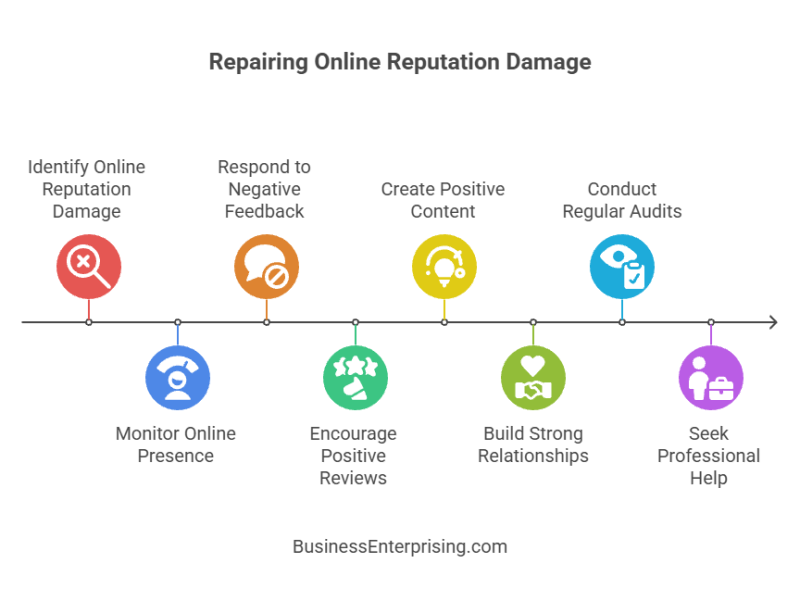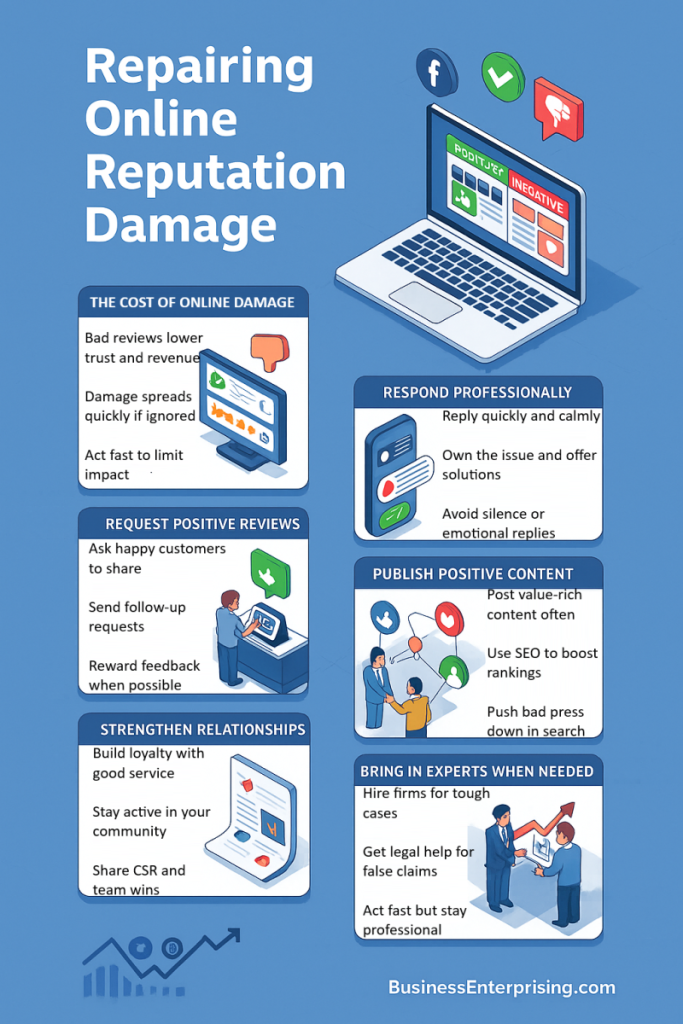 In today’s digital age, a company’s online reputation is as important as its real-world reputation. With consumers relying heavily on the internet to make purchasing decisions, negative information or reviews can significantly impact a business’ success. Online reputation damage can arise from various sources, such as negative reviews, social media backlash, or adverse media coverage. Addressing and repairing online reputation damage requires a strategic and proactive approach. Below we’ll discuss effective strategies that companies can implement to restore their online reputation and rebuild trust with their audience.
In today’s digital age, a company’s online reputation is as important as its real-world reputation. With consumers relying heavily on the internet to make purchasing decisions, negative information or reviews can significantly impact a business’ success. Online reputation damage can arise from various sources, such as negative reviews, social media backlash, or adverse media coverage. Addressing and repairing online reputation damage requires a strategic and proactive approach. Below we’ll discuss effective strategies that companies can implement to restore their online reputation and rebuild trust with their audience.
Understanding the Impact of Online Reputation Damage
Online reputation damage can have far-reaching consequences for a business. Negative reviews and comments can deter potential customers, leading to decreased sales and revenue. Furthermore, a tarnished reputation can affect partnerships, investor relations, and employee morale. The speed at which information spreads online exacerbates the issue, making it essential for companies to act quickly and effectively to mitigate the damage. Understanding the root cause of the damage is the first step in developing a plan to address it.
Monitoring Online Presence
One of the most crucial aspects of managing online reputation is continuous monitoring. Companies must keep track of what is being said about them across various online platforms, including social media, review sites, forums, and news outlets. Using tools like Google Alerts, social media monitoring software, and reputation management services can help businesses stay informed about online mentions and reviews. Regularly monitoring online presence allows companies to identify and address issues before they escalate.
Additionally, engaging with customers and responding to reviews can demonstrate a commitment to customer satisfaction. When companies acknowledge feedback and address concerns promptly, it shows that they value their customers and are willing to make improvements. This proactive approach can help mitigate the negative impact of online reputation damage and build a positive image.
Responding to Negative Reviews and Comments
Responding to negative reviews and comments is a critical step in repairing online reputation damage. It is essential to address negative feedback professionally and constructively. Companies should acknowledge the issue, apologize if necessary, and provide a solution or next steps. By demonstrating empathy and a willingness to resolve the problem, businesses can turn a negative situation into a positive customer experience.
Moreover, transparency is key when responding to negative feedback. Being open about the steps being taken to address the issue can build trust with customers and show that the company is committed to improvement. It is also important to respond promptly, as delayed responses can exacerbate the situation and give the impression that the company does not care about its customers.
In cases where false or malicious information is being spread, companies may need to take additional steps to address the issue. This could involve contacting the platform hosting the content to request its removal or seeking legal advice if the information is defamatory. However, these actions should be taken carefully to avoid further escalating the situation.
Encouraging Positive Reviews and Testimonials
While addressing negative reviews is important, encouraging positive reviews and testimonials can help balance the overall online reputation. Satisfied customers are often willing to share their positive experiences, but they may need a gentle nudge. Companies can encourage happy customers to leave reviews by providing easy-to-use review platforms, sending follow-up emails, or offering incentives such as discounts or loyalty points.
Highlighting positive reviews and testimonials on the company’s website and social media channels can also help reinforce a positive image. Sharing success stories, case studies, and customer testimonials can demonstrate the value and quality of the company’s products or services. This not only helps build credibility but also provides a counterbalance to negative feedback.
Creating and Promoting Positive Content
Creating and promoting positive content is another effective strategy for repairing online reputation damage. Content marketing can play a significant role in shaping public perception and showcasing the company’s expertise and values. Companies should focus on producing high-quality content that provides value to their audience, such as blog posts, articles, videos, and infographics.
Additionally, leveraging social media platforms to share positive content and engage with followers can help build a positive online presence. By consistently posting valuable and relevant content, companies can establish themselves as thought leaders in their industry and enhance their reputation. Collaborating with influencers, industry experts, and satisfied customers to create and share content can further amplify positive messages.
SEO (Search Engine Optimization) also plays a crucial role in managing online reputation. By optimizing positive content with relevant keywords, companies can improve their search engine rankings and ensure that positive information appears prominently in search results. This helps push negative content further down the search results, reducing its visibility and impact.
Building and Maintaining Strong Relationships
Building and maintaining strong relationships with customers, partners, and stakeholders is essential for long-term reputation management. Companies should focus on delivering exceptional customer service, maintaining open communication, and addressing concerns promptly. Building trust and loyalty with customers can help mitigate the impact of negative feedback and enhance overall reputation.
Furthermore, engaging with the community and participating in corporate social responsibility (CSR) initiatives can positively influence public perception. Supporting charitable causes, sponsoring local events, and promoting sustainable practices can demonstrate the company’s commitment to making a positive impact. These efforts can help build a positive reputation and create goodwill among customers and the broader community.
Conducting Regular Reputation Audits
Regular reputation audits are essential for identifying potential issues and ensuring that reputation management efforts are effective. Companies should conduct periodic audits to assess their online presence, review feedback and reviews, and evaluate the effectiveness of their reputation management strategies. This involves analyzing key metrics such as sentiment analysis, review ratings, social media engagement, and search engine rankings.
By conducting regular audits, companies can identify trends, track progress, and make data-driven decisions to improve their reputation management efforts. It also allows them to stay proactive and address potential issues before they escalate.
Seeking Professional Help
In some cases, managing online reputation damage may require professional assistance. Reputation management firms specialize in helping companies repair and maintain their online reputation. These firms can provide expert guidance, develop customized strategies, and implement effective solutions to address reputation issues. Seeking professional help can be particularly beneficial for companies facing significant or complex reputation challenges.
Additionally, legal advice may be necessary if the company is dealing with false or defamatory information. Consulting with legal experts can help companies understand their rights and take appropriate action to protect their reputation.
Repairing online reputation damage is a multifaceted process that requires a strategic and proactive approach. By monitoring online presence, responding to negative feedback, encouraging positive reviews, creating and promoting positive content, building strong relationships, conducting regular audits, and seeking professional help when needed, companies can effectively manage and repair their online reputation.
Conclusion
Maintaining a positive online reputation is essential for business success in the digital age. Companies must prioritize reputation management and be prepared to address challenges promptly and effectively. By implementing these strategies, businesses can rebuild trust, enhance their online image, and achieve long-term success. As the digital landscape continues to evolve, staying vigilant and proactive in managing online reputation will remain a critical component of business strategy.


